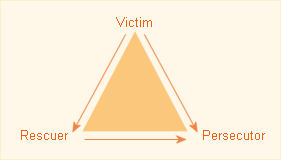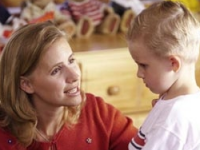Parents
The roles we teach our children
Joan's Story
Parental Course
Parents who can benefit from this course
The roles we teach our children
Life is like a great play. We were taught certain roles before the age of six years. This is learnt without us even knowing it. Up to this day you may not be aware of the roles you have been taught as a child and how you are acting according to the rules of it.
When we play these roles we are captured in the Victim Trap. The Victim Trap is the basis for dysfunctional relationships and behavior; this trap can cause great difficulty in our lives
The first position you can take is the role of the Victim. The Victim is the "poor me". While a Victim the person feels helpless and powerless. This person has trouble coping with the everyday demands of life. This may vary from not being able to keep a job, always being sick or not being able to discipline the children. He/She blames others for the position they are in and usually is dependant on another person to survive or cope in life because they cannot seem to make it on their own.
 The next part is played by the Rescuer. This is the person who goes to a lot of
trouble to help others. His/Her own needs are put off most of the time and the needs of
others are the priority. Rescuers want to help others so that they can be happy and safe
and will not feel comfortable when another is unhappy. Rescuers will try to solve others'
problems and sacrifice themselves and their needs. Unfortunately this is such a heavy load
to carry that the Rescuer can get very tense and this can lead to burn-out. The Rescuer
also needs the Victim because by solving the Victim's problems the Rescuer feels worth a
lot more. In this way the Rescuer is also dependant on the Victim to feel good about
him/her.
The next part is played by the Rescuer. This is the person who goes to a lot of
trouble to help others. His/Her own needs are put off most of the time and the needs of
others are the priority. Rescuers want to help others so that they can be happy and safe
and will not feel comfortable when another is unhappy. Rescuers will try to solve others'
problems and sacrifice themselves and their needs. Unfortunately this is such a heavy load
to carry that the Rescuer can get very tense and this can lead to burn-out. The Rescuer
also needs the Victim because by solving the Victim's problems the Rescuer feels worth a
lot more. In this way the Rescuer is also dependant on the Victim to feel good about
him/her.The last part is played by the Persecutor. The person playing this role is easy to recognize. He/She can abuse people and uses his/her anger to scare and bully others. Another way of abusing others is by ignoring them. The Persecutor can be addicted to substances like alcohol or drugs. Usually the Persecutor scares people into obeying him/her. People fear this person and do not respect him/her.
All of us have a favorite part we play in this Victim Trap. Even though this is true, we do, at some stage, play the other roles as well.
Joan's Story
Joan comes home after having a bad day at the office. She shouts at her husband which puts her into the role of Persecutor. By being screamed at Joan's husband becomes the Victim. Later on that evening Joan feels bad about her behavior and goes into the Rescuer position. She starts to compliment her husband on being such a great handyman and takes him out to dinner. He has not yet spoken his mind about the whole screaming incident and ignores Joan throughout dinner. By ignoring her he becomes the Persecutor and puts Joan in the Victim position. Joan feels hurt about spending all the money on dinner when her husband is so unthankful. The next day the roles are changed again when Joan's husband feels bad about the whole dinner episode and becomes the Rescuer by sending her flowers and a voucher to the spa.
Over and over the game is played. Players constantly change roles and nobody ever wins. They are not even aware of the predictable game they are playing.
We are also playing this game with our children.
Children witness the different roles we as parents take on. Sometimes we are the Persecutor and scare our children; sometimes we are the Rescuer by taking on their responsibilities by helping them in situations which they should rather have faced by themselves in order to learn from the consequences; or as the Victim by, for example, complaining to our friends about our bad mannered children.
By witnessing the parts parents play in the Victim Triangle, children start to imitate their parents. They are quick to realize - on a subconscious level - that when they play the victim and tell Mommy how terrible it is at school and how they do not have friends, they immediately get love, support and pity. A pattern is formed and children can take on the role of Victim for the rest of their lives, just to get the pity they know so well.
Children quickly realize when their parents are Victims and are not strong enough to support them. Children are trained in this way to become little Rescuers who always help the parents and take on their responsibility. Unfortunately this is a too heavy load for a child to carry and usually causes a lot of tension and other problems.
By witnessing a parent being a Persecutor who uses force with his/her partner, the child may become a Persecutor in his own life too. He can also adopt the role of Victim because of all the abuse he/she experienced from this parent.
Now why are these roles bad? Isn't being a Rescuer a noble choice? These roles are very important when we interact with other people in our lives or form relationships. When a child is taught subconsciously to be the Victim in a family, he/she usually finds that he/she is surrounded by Persecutors; people bullying, abusing or even molesting him/her. The child playing this role feels weak and cannot defend him/herself. The abuse usually weakens them further. While becoming an adult the child holds onto this role of Victim and finds him/herself in relationships that are just as abusive during adulthood. Advising the person to leave the abusive partner has no response, because the problem has already started during childhood.
The role of Rescuer is just as bad for your child. When the child learns that his/her worth is only in helping others and not in being him/herself, the child will choose all the little Victims at school to be friends with. During adulthood the Rescuer will still hold onto a partner because of his/her weakness, no matter how many addictions or dysfunction there are in the relationship. The Rescuer will be as unhappy as can be, but not be able to find freedom, because the role of Rescuer was engraved early on in childhood.
Children who become little Persecutors will always be in trouble by bullying weaker ones or even their parents.
Learning how to rid yourself of playing these roles in the first place, will be a great relief for you in your life. Leaving helplessness, co-dependency, blame and shame behind leads to great freedom.
There is no easy way of freeing yourself and your family from the Victim Trap and the roles attached to it. The first step is to learn all you can about the structure which is played out, not only in families, but in all relationships. Learn how to not teach these roles to your children. The best tool available for this is by working through the Parental Course. This is a course consisting of five modules, which teach parents how to discipline children so they do not adopt the Victim, Rescuer or Persecutor roles.
Parental Course
 Discipline in Module 1 is one of the easiest ways a child learns one of these roles and
parents are totally unaware of this until they work through the module on discipline.
Discipline in Module 1 is one of the easiest ways a child learns one of these roles and
parents are totally unaware of this until they work through the module on discipline.Module 2 is about spending time with your child and family in a way that is healthy and consists of no games contained in the Victim Trap.
Module 3 is about a healthy family structure and the emotional wounds engraved into each parent's heart which is unconsciously passed down to their children.
Module 4 is about handling children's emotions. As the family is the best place to learn healthy expression of emotions, children benefit greatly from parents showing and coaching them in a safe environment on how to be emotionally intelligent.
In Module 5 the parent is taught the different developmental stages of a child and how to cope with it. During each of these unique stages children need specific messages from their parents. This module teaches parents these messages and how to give them. Sexual development is very important for a child and has to be handled correctly or else the scars may be carried for years. In module 5 the parent is taught what the stages of normal sexual development are and how to handle them. It is also very important for a parent to know the warning signs for children with sexual wounds.
The course for parents is very valuable for both parent and child. It is not enough today to say that our parents raised us well and that there is nothing wrong with us, we can simply raise our children the way we were raised. In the competitive society we live in today we have wonderful new knowledge at our fingertips; knowledge that can help strengthen us and our children; knowledge that can help our children get even further in life than us; knowledge that can help them in their lives to not become victims of a sometimes sick society; and knowledge that strengthens and heals them by just practicing a few simple techniques.
Parents who can benefit from this course
Parents with children already in therapy (for whatever reason). Children's therapeutic processes usually progress faster when the parents practice certain techniques at home.
Parents who have difficulty and frustration while disciplining children.
Parents who want to strengthen their children emotionally. A child gets very strong emotionally when parents practice positive discipline.
Teachers can practice all the techniques taught in the course in class and see children grow emotionally. This course is good for identifying a child with emotional needs.
Pregnant mothers and fathers. The greatest way to bless your child is to give him/her all the love and messages he/she needs from conception on. Bless your baby this way.
Parents who believe their children are being bullied.
Parents who are concerned about one of the following: aggressiveness, bed-wetting, crying, fearfulness, shyness, low self-esteem, a traumatic experience that occurred, divorce, death of a loved one, stealing, not wanting to go to school.
When your child is going through one of the abovementioned, he/she needs special care and the course for parents will help you with this. The course teaches many techniques that you can use to help your child. Children usually improve when parents practice these techniques.

 © Copyright 2009-2017 Happy Family Therapy
© Copyright 2009-2017 Happy Family Therapy